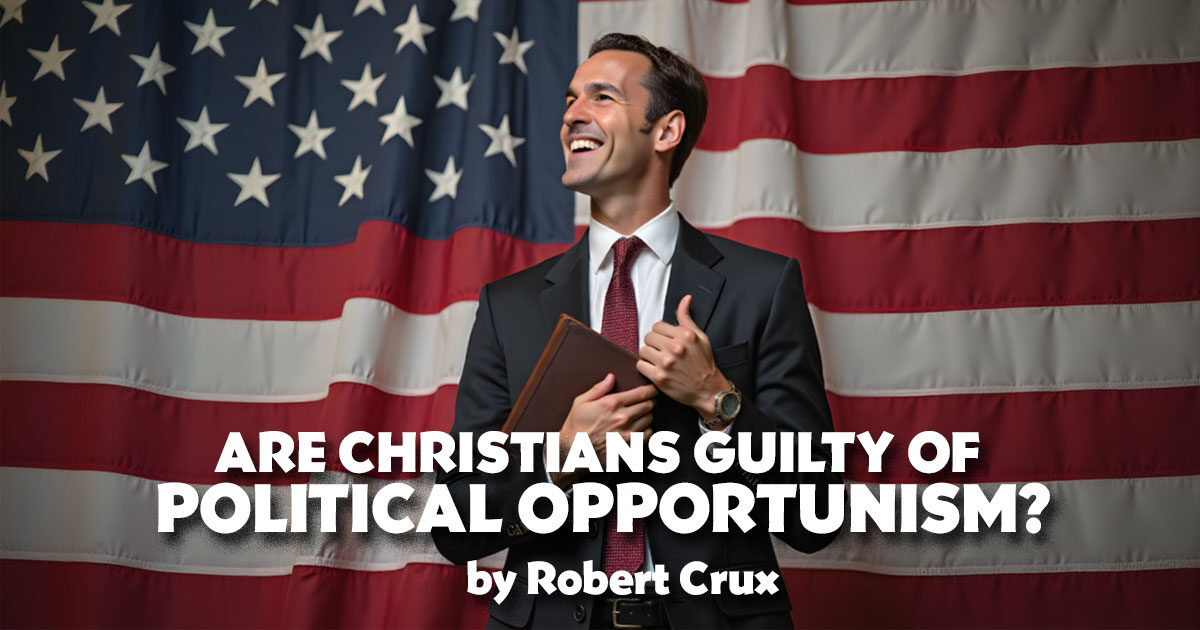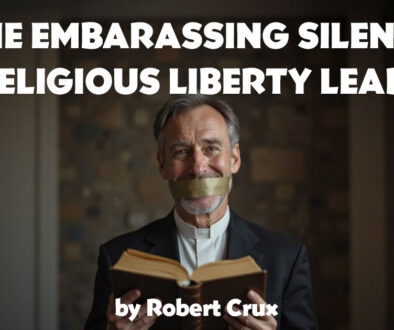Are Christians Guilty of Political Opportunism?
by Robert Crux | 27 May 2025 |
Jesus, throughout his ministry, was on the side of the poor and exploited.
Yet Christian politicians in 2025 America seem to have forgotten that. When political leaders use religion to try to justify policies that hurt women, children, immigrants, and the vulnerable; when Christianity justifies racism, xenophobia, violence, and misogyny; the Bible declares that their prayers have become an offense to God (Amos 5:12-24).
Shouldn’t the moral values of love, mercy, and justice go deeper than partisan loyalty? How can religious conservatives working in key political roles be comfortable targeting those that the Bible is most concerned about?
A means to an end
Religion and political power have long been inextricably intertwined, for better or worse, with personal charisma and celebrity. Some people of faith cannot resist the temptation to equate political power with divine authority. A flamboyant, self-proclaimed Christian politician whose ideology masquerades as religion and exploits scripture and sacred symbols seems to get away with shamelessly ignoring the teachings of Christ.
For some Christian politicians, Jesus is seen as too liberal, too weak and woke. Russell Moore, editor-in-chief of Christianity Today, has said, “When we get to the point where the teachings of Jesus himself are seen as subversive to us, then we’re in a crisis.” The moral clarity that conservative Christians like to be known for has been weakened by a thirst for political power.
It should be a warning to Christians of all stripes and persuasions that Jesus condemned the heartless actions of the religious leaders of his day, and said they had neglected the weightier matters of the law: justice and mercy and faith (Matthew 23:14-23).
Losing credibility
Christianity can offer salvation and hope, but it can also be used as a tool of violence and control. This ideology, that fuses Christian nationalism with authoritarianism while using religious teachings and scripture to justify oppressive policies, has been labeled “Christofascism.” Daily there are new attacks on what the Bible calls “the least of these.”
Michael Gerson in an opinion piece for the Washington Post says:
“…the credibility of religious conservatives is undermined by the friends they have chosen to keep. Their political alignment with MAGA activists has given exposure and greater legitimacy to once-fringe ideas, including Confederate nostalgia, white nationalism, antisemitism, replacement theory and Q-Anon accusations of satanic child sacrifice by liberal politicians.”
Of Christian aid groups being stripped of funding by the U.S. government, Steve Rabey writing for Baptist News Global says:
“Conservative Christian groups that are pro-life when it comes to abortion have embraced the claim that Trump’s aid cuts won’t lead to any deaths, even though field workers are already reporting fatalities.”
Christians who say they are pro-life undermine their own credibility when they favor the removal of aid to the poorest people on earth. If all they want is a child born but not a child fed, educated, or housed, they are not pro-life, only pro-birth. But in the current situation, Christian politicians supporting a tax hike for healthcare, childcare, education, and living expenses would risk being condemned as socialists or left-wing extremists.
David French, an opinion columnist for the New York Times, writes:
“The new religious right has turned against the old religious right… the focus of Christian right isn’t on the defense of liberty; it’s on the accumulation of power. And it is using that power to impose its will, including by imposing its will on Christian organizations it has decided are woke or opposed to President Trump’s agenda.”
Christians colluding with oppressive practices are demonstrating to the world their human capacity to distort spiritual truths for personal or national gain.
Turning against empathy
Writes David French:
“The Republican Christian right made a hard turn against immigration and, in its most extreme political faction, is turning against empathy itself.”
How can people of faith claim to follow Christ while excusing cruelty? This, it seems to me, is evidence of the wealth-corruption of Christianity in America. Elle Hardy, in her piece entitled The Evangelicals Calling for War on Poor People, writes:
“A new, antisocial strain of the prosperity gospel is making its way into pulpits and breeding new hostility toward the least fortunate Americans.”
For Christian politicians who believe that there are better ways than having the state look after people, this ideology is a powerful incentive (or excuse) to look the other way—and make more profit.
We believers are equipped with the truth of God’s love, and the call to extend that love to those in need. This extension of our faith is not merely a matter of charity: it is a divine mandate. God’s heart beats for those who suffer injustice, and by putting our faith into action, we become the hands and feet of Christ in our communities.
The way America is handling the legal fight about due process for wrongfully deporting immigrants and children born in the United States gives the deeply concerning impression that the laws and processes put in place for the protections of people’s rights are meaningless. Removing residents off American streets without due process of law and deporting them to foreign lands and prisons is the modus operandi of dictators, and Christians serving in the current administration have turned against empathy by supporting a system that exploits the vulnerable.
What of Adventists?
Adventists are not immune from the philosophy of these right-wing extremist groups. Michael Campbell, director of Archives, Statistics, and Research for the North American Division, points out that some prominent Adventist leaders were members of the Ku Klux Klan during the 1920s because the Klan opposed evolution and immigration—stances that aligned, disturbingly, with certain church ideals at the time.
Campbell writes:
“More than anything else, Adventists during the 1920s noted with appreciation how the Klan stood against the infiltration of Roman Catholicism within American culture and society. “
Wearing their white robes and masks and carrying signs labelled “America First,” they held picnics and parades, attended church and funerals. For many white Protestant Americans, the Ku Klux Klan was a respectable pastime for the whole family.
Imagine Adventists in the 21st century, under the banner of the new Christian nationalism, cheering on those who are actively targeting and harming the hungry, the poor, the sick, the elderly, veterans, the disabled, the different, and immigrants—and still somehow expecting people to believe they are followers of Jesus!
For many Adventists of this generation the doctrine of prophetic inevitability, combined with false piety and apathy, is enough to justify the support of Christian nationalism. A silent indifference is thought to forward God’s plan. “Just wait and be patient,” they say. “God is working his purposes out.” Only the future course of history will reveal if this attitude is misleading or accurate.
Yet Christ has never been found among perpetrators of violence, but with victims. Yet at times this principle has been difficult to live for Adventists including, perhaps, in the 21st century.
Ben Carson is a distinguished member of the Adventist church, and vice-chair of the newly created Religious Liberty Commission. Members of this new commission are supporters of Christian nationalism, and Carson himself appears comfortable with this philosophy.
The Rev. Shannon Fleck, executive director of Faithful America, called the commission an attempt to “tear down the wall between church and state.” Rachel Laser, president of Americans United for Separation of Church and State, says:
“The commission is not about religious liberty. Both the majority of commissioners and the commission’s six areas of focus show that it’s all about advancing Christian Nationalism.”
In other eras, the Seventh-day Adventist Church refused to be silent in the face of injustice. In its early years Adventists stood strongly against slavery, for example. Our leaders saw our church being “set apart” not as a badge of superiority, but a legacy of courage and compassion.
But where does the Seventh-day Adventist Church stand now? Will the Adventist Church be tempted to join the evangelicals who want to narrow the table instead of expanding it? Our religious liberty leaders have remained largely silent on the matter.
It feels like the monster of Christian nationalism is standing outside the door—and we’ve left the door unlocked.
Jesus and oppression
The stories of Jesus teach us not to condemn those different from us, but to alleviate the suffering of others and be merciful. He spoke against systems of oppression that benefited those in power who excluded others economically, socially, and politically.
Jesus wants us to stand with victims of hate, not against them. In Matthew 25 Jesus explains,
“I was hungry and you gave me food, I was thirsty and you gave me drink, I was a stranger and you welcomed me, I was naked and you clothed me, I was sick and you took care of me, I was in prison and you visited me.”
And what was done to the least reverberates for all of eternity. The Hebrew wisdom from the prophet Micah should still shape our lives: “to do justice, and to love kindness, and to walk humbly with your God.”
In the New Testament, Jesus Christ is our example of standing against oppression. His ministry consistently reached out to the marginalized and oppressed, challenging societal norms and religious leaders who perpetuated injustice. Does God—and the world—expect anything less from 21st-century Seventh-day Adventists?
Perhaps this is why Ellen White said, “The last message of mercy to be given to the world is a revelation of His character of love.” Without love, there is no justice—only exploitation.
 Robert D. Crux, Ed.S, worked as a teacher, principal, and superintendent of schools over a period of 35 years in Adventist education before retiring in 2016 to Lawton, Michigan, where he enjoys writing, reading, biking, model railroading, and, most of all, his grandchildren.
Robert D. Crux, Ed.S, worked as a teacher, principal, and superintendent of schools over a period of 35 years in Adventist education before retiring in 2016 to Lawton, Michigan, where he enjoys writing, reading, biking, model railroading, and, most of all, his grandchildren.




